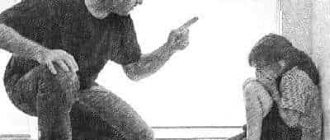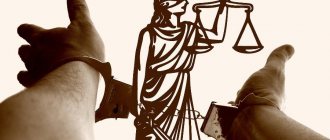Non-execution and improper execution in relation to minor children
In accordance with Art. 38 of the Constitution of the Russian Federation “the care of children and their upbringing is entrusted to their parents.” This means incomplete fulfillment of parental responsibilities, accompanied by incorrect and untimely upbringing of children.
Legal relations between parents and children are regulated by family law, in particular Art. 63 of the Family Code of the Russian Federation stipulates that “parents are responsible for the upbringing of their children.”
Failure to comply with the requirements of the law entails certain types of liability , which in Russian law are enshrined in the Criminal Code of the Russian Federation, in the Civil Code of the Russian Federation, the Code of Administrative Offenses of the Russian Federation, as well as in the Family Code of the Russian Federation.
From the point of view of a general understanding of improper performance of parental responsibilities, it can be noted that this is neglect of children, lack of attention to them from parents, lack of warmth, affection, love and understanding.
If a child lives in conditions that do not meet sanitary standards, as well as non-compliance with other standards, government officials raise the issue of bringing them to one of the types of liability, depending on the severity of the acts.
What responsibilities are provided?
Current Russian legislation provides for 4 types of liability. It is graded depending on the severity of the actions performed, as well as the consequences that occur. The following types of liability exist:
- criminal law;
- civil law;
- administrative and legal;
- family law
Criminal under articles of the Criminal Code of the Russian Federation
Responsibility arises in accordance with Art. 156 of the Criminal Code of the Russian Federation for improper performance of parental responsibilities. If the standards are not followed, the parent may receive a fine or other types of punishment. In particular, compulsory or executive work, forced labor, as well as deprivation of the right to hold certain positions. The most severe type of punishment in this provision is imprisonment for up to 3 years.
The subjects of this crime include not only parents, but also legal representatives, teaching staff or representatives of educational organizations, medical, social workers and other persons who are entrusted with the responsibility to exercise supervision.
For criminal liability, the actions must be accompanied by cruel treatment of a child. They can be expressed in:
- physical violence, beatings, torture or harm to health;
- mental violence, for example, humiliation of a child or insult;
- deprivation of a child of water, food, clothing, failure to provide medical care, etc.
To impose a sentence, the prosecution must prove the fact of child abuse , and the defense must collect all kinds of evidence confirming otherwise.
Civil
This type of liability occurs for harm caused to a minor child in accordance with Art. 1073-1075 Civil Code of the Russian Federation. Family law does not directly provide for this type of responsibility, but this follows from its provisions, as well as from Art. 1064, 1099 of the Civil Code, which established general rules on compensation for moral damage.
The basis for holding a parent liable will be the failure of the latter to fulfill his duties. For example, failure to provide food or clothing or failure to provide proper medical care in case of illness, etc.
To bring parents to civil liability, as a result, harm to the child’s health must be caused.
If violations are detected, parents must compensate for moral damage and damages. It is the responsibility of the court to make appropriate decisions. Moreover, in accordance with the norms of the Civil Code, liability for harm caused varies depending on the age of the child: from 14 years and from 14 to 18 years. A separate rule applies to parents deprived of parental rights (we wrote about deprivation of parental rights in this material).
Administrative: fine and other types of penalties under the Code of Administrative Offenses
Provides for Art. 5.35 of the Code of Administrative Offenses of the Russian Federation in case of failure by parents to fulfill their duties . This type of liability extends to parents or legal representatives for intentional failure to fulfill their responsibilities for raising minors.
This may include the following:
- lack of care and moral education of the child;
- partial or complete lack of physical development of the child;
- systematic violation of norms regarding the child’s receipt of compulsory education, etc.
The legislator left the list of violations open, so the severity of illegal actions is determined in each case individually.
To be held accountable, the offense must be repeated systematically. For example, a child constantly does not attend school or leaves home several times, etc. In this case, the offense is considered to be ongoing, so the parents can be held accountable.
For failure to fulfill or improper fulfillment of responsibilities for the maintenance, upbringing and education of children, the following types of punishment are applied:
- warning;
- fine from 100 rubles to 5000 rubles;
- administrative arrest for up to 5 days.
The type of punishment depends on the severity of the offense committed, the consequences that occurred, the presence of mitigating or aggravating circumstances, as well as whether the offense was committed for the first time or repeatedly.
Family law
Responsibility in accordance with Art. 69 of the Family Code of the Russian Federation is one of the most common. Parents may be deprived of parental rights if they:
- systematically evade paying alimony (for several months);
- children are abused (beaten, insulted, humiliated, etc.);
- drink alcohol and/or drugs (are registered at a neurological clinic);
- committed a crime against life or health (for example, the father killed the child’s mother), etc.
In this case, the guardianship and trusteeship authorities may consider depriving the parents (or one of them) of parental rights.
Involvement of other persons involved in raising children
The regulatory legal framework equates other persons to parents. The legislator includes:
- guardians;
- trustees (and not only individuals, but also representatives of guardianship authorities);
- state institutions for the upbringing and education of children.
In addition, responsibilities are assigned to adoptive parents and legal representatives.
General concepts
When considering such a topic, it is simply impossible not to deviate from the strict framework of jurisprudence and say a few words about the current realities of child crime in the Russian Federation. Without unnecessary hypocrisy, it is fair to say that life in Russia is not easy. Perhaps in the “main” cities of our country, such as Moscow and St. Petersburg, the standard of living corresponds to European standards, at least this is what they say from high stands.
But in other regions/subjects, especially in villages, villages and towns, every day a huge number of children become victims of abuse and lack of any education, and often training. What is the reason for this cruelty towards defenseless children? It's all about alcohol or the lack of any moral standards. Perhaps such an introduction will upset and cause indignation among those who recognize themselves in this description, and it will surprise some or simply make them laugh, but this is the real state of affairs in the Russian Federation.
Abuse of parental rights
In accordance with Part 1 of Art. 65 of the Family Code of the Russian Federation, parents, when exercising their rights, must not contradict the interests of their children. Abuse of parental rights is considered as raising a child to the detriment of his desires or interests.
The issue of maintaining a balance of interests of parents and children in jurisprudence is open. Art. 69 of the Family Code of the Russian Federation mentions the term abuse of parental rights, but does not disclose this concept, which entails certain difficulties.
This concept is interpreted by the Plenum of the Supreme Court No. 10 of May 27, 1998. Here he includes the following:
- parents' obstacles to getting an education (ban on going to school, beliefs about the uselessness of education, etc.);
- ban on communication with close relatives;
- inclination to theft, begging;
- involving a child in the use of alcohol, drugs or other prohibited substances;
- spending the child’s funds (for example, living on a child benefit or disability pension), etc.
The Plenum did not define an exhaustive list. All cases are considered individually by the guardianship authorities.
We talked about the rights of parents and children here.
You may find our articles about children left without parents, about establishing kinship, about limiting and restoring parental rights, about the rights of adults and children during divorce and with parents in a civil marriage, about the maintenance of parents by adult children, useful.
How are such cases identified?
On the territory of the Russian Federation, such cases are controlled by a number of government bodies:
- the prosecutor's office;
- ATS;
- guardianship and trusteeship;
- commissions on juvenile affairs.
In order to hold a parent accountable, any interested party must write a statement to one of the authorities. For example, one of:
- parents;
- relative;
- neighbor;
- school teacher;
- sports trainer;
- teacher, etc.
After the application, an inspection will be carried out and evidence will be collected.
The court includes the following:
- witness statements;
- conclusions of medical workers and guardianship authorities;
- child's testimony;
- characteristics from the place of study;
- characteristics of parents from work;
- inspection reports, etc.
Where to go for protection
Taking into account all of the above, a reasonable question arises about where a minor can turn for protection. It is necessary to understand that teenagers who have already developed sufficiently as individuals, but are still recognized as children, since they have not reached adulthood, also become victims of parental negligence.
Of course, first of all, this is a statement to the police; any person has the right to turn to law enforcement agencies to protect their rights and freedoms. But due to the current situation in the law enforcement system, the appropriateness of such treatment is sometimes questionable, and this is a huge disadvantage for our state as a whole. Next come the guardianship and trusteeship authorities. Each subject of the Russian Federation has its own representative offices of these services, which have hotlines and other options for contact, including anonymous ones.
It is worth paying attention to the “Helpline” service. This service provides psychological and, most importantly, anonymous support to both children and their parents. Each person can call the toll-free number 8-800-2000-122 and receive consultation, support and advice on the current situation. Here we should say a few words about such a preventive set of measures as an examination of living conditions and upbringing in the family.
This check can be initiated for many reasons, for example:
- Change of permanent residence, which is accompanied by a check to identify possible dangerous factors for a minor.
- Statement from citizens - these can be either anonymous or open requests from neighbors, friends, relatives, which speak of abuse or failure of parents to fulfill their upbringing responsibilities.
- Personal appeal of a minor or his appeal to a medical institution for medical assistance for reasons that may be related to his parents.
The inspection is carried out by an authorized commission, which may include teachers, members of the administration of the educational institution, a district police officer, a medical worker, and an employee of the guardianship and trusteeship authority. Upon completion of the survey, a report is drawn up indicating all the identified circumstances.




